Here are some events that happened on November 23rd. It could be an event or a person that died or was born on that day
1804 Born: Franklin Pierce, American general, lawyer, and politician, 14th President of the United States (d. 1869)
Franklin Pierce (November 23, 1804 – October 8, 1869) was the 14th president of the United States (1853–1857), a northern Democrat who saw the abolitionist movement as a fundamental threat to the unity of the nation. He alienated anti-slavery groups by supporting and signing the Kansas–Nebraska Act and enforcing the Fugitive Slave Act, yet he failed to stem conflict between North and South, setting the stage for Southern secession and the American Civil War.
Pierce was born in New Hampshire; he served in the U.S. House of Representatives and Senate until his resignation in 1842. His private law practice was a success, and he was appointed New Hampshire's U.S. Attorney in 1845. He took part in the Mexican–American War as a brigadier general in the Army. He was seen by Democrats as a compromise candidate uniting northern and southern interests and was nominated as the party's candidate for president on the 49th ballot at the 1852 Democratic National Convention. He and running mate William R. King easily defeated the Whig Party ticket of Winfield Scott and William A. Graham in the 1852 presidential election.
As president, Pierce simultaneously attempted to enforce neutral standards for civil service while also satisfying the diverse elements of the Democratic Party with patronage, an effort which largely failed and turned many in his party against him. He was a Young America expansionist who signed the Gadsden Purchase of land from Mexico and led a failed attempt to acquire Cuba from Spain. He signed trade treaties with Britain and Japan, while his Cabinet reformed their departments and improved accountability, but these successes were overshadowed by political strife during his presidency. His popularity declined sharply in the Northern states after he supported the Kansas–Nebraska Act, which nullified the Missouri Compromise, while many whites in the South continued to support him. Passage of the act led to violent conflict over the expansion of slavery in the American West. Pierce's administration was further damaged when several of his diplomats issued the Ostend Manifesto calling for the annexation of Cuba, a document which was roundly criticized. He fully expected to be renominated by the Democrats in the 1856 presidential election, but was abandoned by his party and his bid failed. His reputation in the North suffered further during the American Civil War as he became a vocal critic of President Abraham Lincoln.
Pierce was popular and outgoing, but his family life was a grim affair, with his wife Jane suffering from illness and depression for much of her life. All of their children died young, their last son being gruesomely killed in a train accident while the family was traveling shortly before Pierce's inauguration. He was a heavy drinker for much of his life, and he died of cirrhosis of the liver in 1869. Historians and scholars generally rank Pierce as one of the worst and least memorable U.S. Presidents.
US stamps depicting Franklin Pierce
1887 Born: Boris Karloff, English actor (d. 1969)
William Henry Pratt (23 November 1887 – 2 February 1969), better known by his stage name Boris Karloff, was an English actor who was primarily known for his roles in horror films. He portrayed Frankenstein's monster in Frankenstein (1931), Bride of Frankenstein (1935) and Son of Frankenstein (1939). He also appeared as Imhotep in The Mummy (1932).
In non-horror roles, he is best known to modern audiences for narrating and as the voice of the Grinch in the animated television special of Dr. Seuss' How the Grinch Stole Christmas! (1966). For his contribution to film and television, Karloff was awarded two stars on the Hollywood Walk of Fame.
US stamps depicting Boris Karloff portraying the mummy and Frankenstein's monster
1890 – King William III of the Netherlands dies without a male heir and a special law is passed to allow his daughter Princess Wilhelmina to succeed him.
William III (Dutch: Willem Alexander Paul Frederik Lodewijk; English: William Alexander Paul Frederick Louis; 19 February 1817 – 23 November 1890) was King of the Netherlands and Grand Duke of Luxembourg from 1849 until his death in 1890. He was also the Duke of Limburg from 1849 until the abolition of the duchy in 1866.
William was the son of King William II and Anna Pavlovna of Russia. On the abdication of his grandfather William I in 1840, he became the Prince of Orange. On the death of his father in 1849, he succeeded as king of the Netherlands.
William married his cousin Sophie of Württemberg in 1839 and they had three sons, William, Maurice, and Alexander, all of whom predeceased him. After Sophie's death in 1877 he married Emma of Waldeck and Pyrmont in 1879 and they had one daughter Wilhelmina, who succeeded William to the Dutch throne. Meanwhile, being the last agnatic dynastic descendant of Otto I, Count of Nassau, the throne of the Grand Duchy of Luxembourg passed to his patrilineal seventeenth cousin once removed (and matrilineal third cousin), Adolphe. To date, he is the last Dutch monarch to die whilst on the throne.
Here are the first couple of sets of stamps issued by the Netherlands depicting King William III








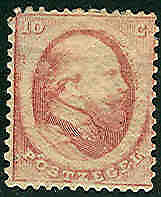


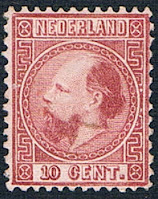

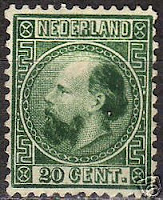
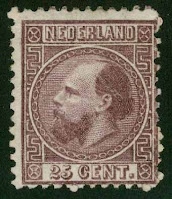
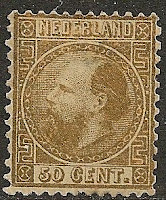






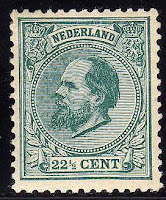


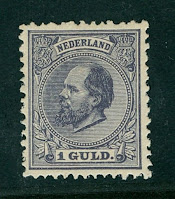
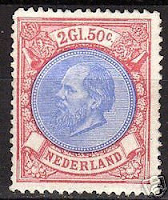
No comments:
Post a Comment